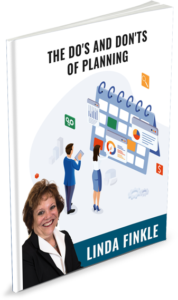Planning is challenging for many people. Even if you believe in the value of planning, it can feel like an overwhelming task. I’ve identified the top twelve challenges people face when planning, and I’ve offered solutions and ideas on how to handle them.
1. Planning isn’t possible. It’s not that I believe I’m incapable of writing a plan; it’s that I don’t believe it will be of any value. I won’t see any changes, goals won’t be accomplished, and it feels like a big time-hog when I don’t know whether or not it will produce results.
Solution: Planning isn’t about the document. It’s about the thought process that goes into creating the document. If you want your business to grow by 20%, you have to determine if that’s 20% gross revenue growth, 20% net revenue growth, 20% in new clients…you get the idea. Then you have to determine how to ensure that happens by determining the steps to reach the goals. It won’t happen simply because you think about it. The value in planning is creating the specific goals and action steps to measure your progress along the way.
2. I don’t know how to create a plan. I’ve read all sorts of information in books or on the Internet but I find it confusing, not specific enough, or there don’t seem to be options that fit my style.
Solution: Your plan has to be your own, something that will work for you, so don’t get hung up thinking there is only one right way to build a business plan. What will make it meaningful to you? What will help you get to where you want to be? Of course, if you purchase Incedo’s products on planning, it will solve this dilemma.
3. I’ve written plans before but don’t accomplish the goals. A lot of time went into creating the plan, yet when I look back I accomplished few, if any, of the goals.
Solution: Ignore this fact. Just because you created goals in the past and didn’t accomplish them does not mean the future will be the same. You’re a different person and have learned new things. This could be the year where you see big changes.
4. My leadership team thinks planning is a waste. Even though I believe in planning, my leadership team thinks this is just another exercise that will zap their time and produce no results.
Solution: You could force them to do it, and frankly, you might have to. Remember you have to model for them the behavior you want to see. If you are ambivalent or vacillate about planning, you won’t get their buy-in. Stay consistent and help them see the value.
5. I’m gung-ho when I start planning but lose momentum along the way. Once I’m into the planning process I realize this is just a lot of work, and time-consuming. How do I stay motivated till the end?
Solution: This happens to most of us. Planning can not only be time-consuming, it requires creative thinking and focus and can be energetically draining. First point is you need to leave plenty of time for planning. You might need 4-6 weeks to build your plan, so start early enough to give yourself the time you need. Take breaks, chunk it out and remind yourself it’s a process that will serve you well. Sometimes you have to simply push yourself to keep going because you know it’s good for you (kinda like going to the gym).
6. I don’t have the time to plan. I’m so busy running my business that taking time to plan doesn’t fit in. Where can I find the time to plan when I’m already maxed out?
Solution: If you are thinking like this, you definitely need to plan. Part of planning is to help you find the things that are getting in the way of your success. If you don’t have enough time, planning will help you see where to find the time. And by the way, time just to think and create is important and time well spent.
7. Even if I create a plan I won’t get the resources I need to accomplish the goals, so why bother? I know I could accomplish huge things if I could just get the resources. But finances, commitment or something else will interfere and prevent me from getting those resources, so why bother planning?
Solution: Zig Ziglar would call this “stinking thinking”—whatever you believe becomes the truth because you will seek out and find the evidence to support what you believe. What to do? You may have to make an adjustment to the goal. You may have to get creative to secure the resources you need. But if you want it enough, you’ll find a way.
8. I’m doing really well now and haven’t written a plan before, so what’s the point? For years I have been successful and I’ve never written a plan. Why now? Things are going great the way they are.
Solution: It’s kinda hard to argue with this one. However, statistics show that those who write down their goals are more likely to achieve them than those who don’t. Think of how much more successful you could be if you had a plan. Can you get in a car and drive to California without a map? Sure. But if you have a map, plan your stops, think of what you need to pack in the car, etc., you are more likely to have an easy journey, arrive safely, and see a lot of interesting sights along the way.
9. What if I write the plan and can’t actually accomplish the goals? How am I going to feel if I can’t accomplish the goals I create when I’m the one who prevented me from succeeding?
Solution: You should know this might happen, but it’s not likely to happen with every one of your goals. If truly you just don’t do the work, you’ll have to own up to it and make changes going forward. Sometimes we don’t reach our goals, and that provides a learning opportunity. Instead of worrying today about how you’ll feel if you don’t accomplish your goals, focus on what you can accomplish.
10. Too many things are unpredictable, like the economy. Things change all the time that I have no control over, so why would I take the time to create a plan when tomorrow the whole thing could blow up?
Solution: It’s true that things change. Part of the value in planning is looking at this fact and determining what you might be able to do about problems should they occur. You may not be able to prevent the problems or uncertainties, but you can assess what they might be and what actions you can take should they happen.
11. I don’t want to admit it but I don’t like being accountable. Planning means accountability and frankly, I don’t like being accountable. If I put it in writing, I believe I’m more obligated. If it’s not in writing, then no one knows.
Solution: Good news that you are honest with yourself. It is true that planning equals accountability. That is part of the value. Perhaps if you think of this as the next big thing you need to learn, you can delve into it. You don’t have to dive into the deep end, but perhaps wading into the shallow end will be a huge step in your personal development.
12. Unless I have to for an investor or banker, I just don’t want to. If I have to create a plan to secure funding, I will, but otherwise, I just don’t want to. Don’t like the idea, don’t see the value…seems like something they teach you in business school but has no real-world application.
Solution: Then don’t do it! Nobody is strong-arming you. All I can say is that the tens of thousands of companies and individuals who plan can’t all be wrong. There’s a reason they take the time year after year. Maybe you could consider taking small steps: Set a few goals this year and see what happens.
Planning can be uplifting, energizing, and exciting. It can also be drudgery and depressing.
Start by downloading our guide on The Do’s and Don’ts of Planning. The guide will give you ideas on what to include, what to leave behind, and how to make the process enjoyable.









